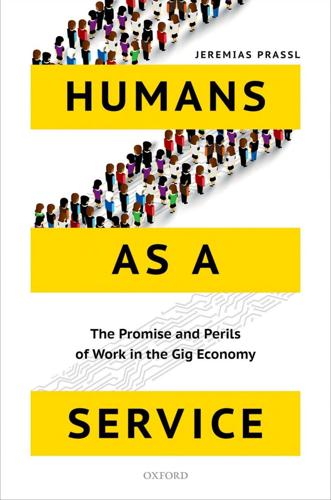
Humans as a Service: The Promise and Perils of Work in the Gig Economy
by
Jeremias Prassl
Published 7 May 2018
It’s not difficult to see why quality might suffer: ‘[T]o be hyper-affordable these are not necessarily on a par with established and leading competitors.’64 Prices, too, are often more expensive than consumers are led to believe: dynamic algorithms allow platforms to increase prices in line with demand and a wide range of other factors—up to many multiples of the underlying cost.65 As regards society at large, it is hard to deny the overall gains of increased economic activity—but how equally are these distributed? Commentators * * * 28 Work on Demand are concerned about the entrenchment of a two-tiered labour market. As The Economist has noted, gig-economy entrepreneurs: have created a plethora of on-demand companies that put time-starved urban professionals in timely contact with job-starved workers, creating a sometimes distasteful caricature of technology-driven social disparity in the process; an article about the on-demand economy by Kevin Roose in New York magazine began with the revelation that the housecleaner he hired through Homejoy lived in a homeless shelter.66 Other concerns extend to the future of a competitive market economy at large.

The Weightless World: Strategies for Managing the Digital Economy
by
Diane Coyle
Published 29 Oct 1998
Across the Atlantic, Britain’s Conservative Government claimed its policies of introducing ‘flexibility’ through the removal of employment protection, the reduction of non-wage social charges like pensions and sick-pay and the encouragement of part-time work explained why the unemployment rate in the UK fell substantially while the rest of Europe suffered jobless rates that seemed condemned to stick in double digits. But critics and political opponents saw only the inequality and insecurity of a two-tier labour market, which might help explain the Labour opposition’s landslide victory in May 1997. There is clearly something in the charge of unfairness. Earnings inequality increased by far more in Britain and America between 1980 and the mid-1990s than in any other developed economies. In many countries, in fact, there was almost no increase in inequality.
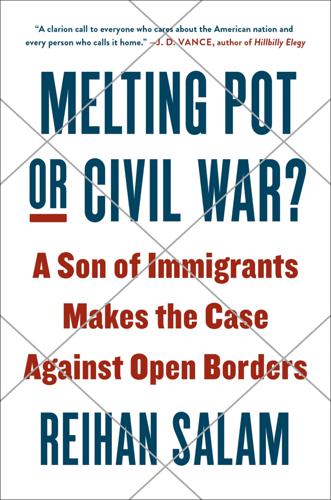
Melting Pot or Civil War?: A Son of Immigrants Makes the Case Against Open Borders
by
Reihan Salam
Published 24 Sep 2018
The Swedish government, meanwhile, has moved to slash benefits for immigrants, on the grounds that the arrival of hundreds of thousands of refugees has strained its ability to be as generous as it had been in the past.4 Swedes of a libertarian bent have welcomed the new openness to low-skill labor. The question is whether most Swedes are eager to embrace a two-tiered labor market, in which an underclass of low-skill immigrants does work that was previously done satisfactorily by a combination of better-paid workers and machines. The evidence suggests not: populists have gained support, and they have done so primarily by promising tighter immigration policies. While Sweden is trying to nudge its employers to adopt more labor-intensive business models, Singapore is doing the opposite.5 Like Sweden, Singapore is one of the world’s richest countries, and its citizens are also among the best educated in the world.
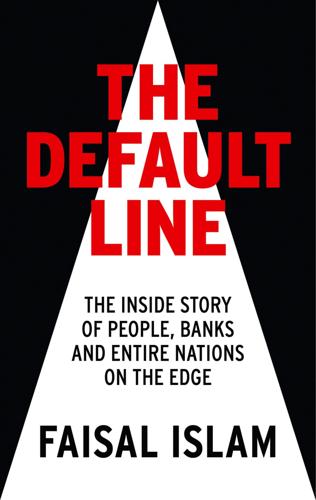
The Default Line: The Inside Story of People, Banks and Entire Nations on the Edge
by
Faisal Islam
Published 28 Aug 2013
Incredibly, in the over-50 age range, there was a net gain over this period of more than 300,000 jobs. The conservative government that came to power in Spain in December 2011 wanted to improve the lot of the jobless youth by making it easier and cheaper to fire highly protected older workers. Spain’s ‘two-tier’ labour market meant it was much easier to lay off younger workers, while older workers stayed in their jobs. The new government’s reforms should in theory help the younger workers, but when I put this to a group of them, they didn’t buy it. Neither did Cándido Méndez, the leader of the UGT, one of Spain’s biggest unions.
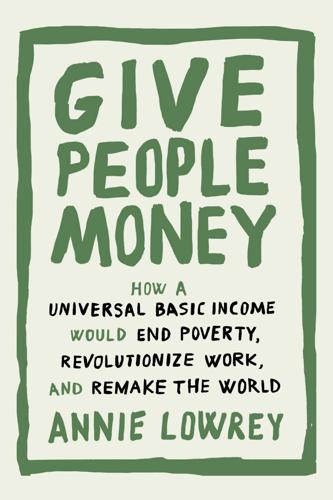
Give People Money
by
Annie Lowrey
Published 10 Jul 2018
That is already what the United States does, to a large extent: allowing in legal and undocumented immigrants, then barring them from accessing benefits. Still, a UBI might increase racial antipathy. It might increase anti-immigrant sentiment, and spur the adoption of anti-immigrant restrictions and policies. It might also foster the creation of a two-tier labor market, with businesses seeking out undocumented workers who would be far cheaper to hire than native-born citizens. Less migration would mean a more sclerotic economy and an older country. A UBI might foster abject racism. There are no easy answers, especially for progressives. * * * In a separate focus group for the Economic Security Project, Paul quizzed a group of Alaskan men about their understanding of the state’s economy and experiences with its cash-grant program.
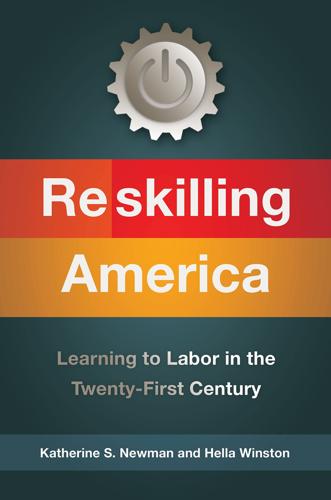
Reskilling America: Learning to Labor in the Twenty-First Century
by
Katherine S. Newman
and
Hella Winston
Published 18 Apr 2016
Some would argue that the well-educated workers will be more productive and hence employers are right to court them for jobs that used to require only a high school degree, especially if they can hire them for next to nothing. But a general deceleration of wages hurts everyone and big disparities between scarce fields and well-stocked ones create a two-tiered labor market in which graduates of elite institutions prosper and degree holders from more modest ones flounder. Although a weakened economy has highlighted this problem, oversupply was in evidence some time ago, well before the Great Recession took its toll. College grads have seen only a 1 percent increase in their average hourly wages over the last decade.
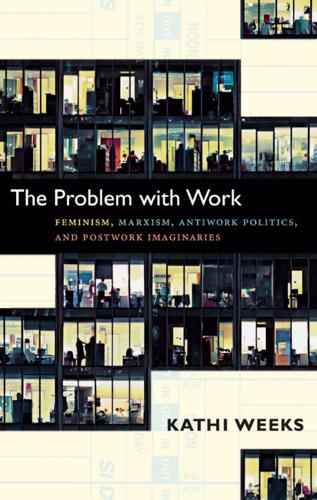
The Problem With Work: Feminism, Marxism, Antiwork Politics, and Postwork Imaginaries
by
Kathi Weeks
Published 8 Sep 2011
Today, in contrast, both the quality of the labor process and the quantity of its material rewards are relevant to the ability of the discourse to deliver on its new ideals of work. With so much at stake, weighed down with so many expectations, it is no wonder that the ethical discourse of work is becoming ever more abstracted from the realities of many jobs. Within the two-tiered labor market, we find new modes of “over-valorized work” at one end of the labor hierarchy and “devalorized work” at the other (Peterson 2003, 76). Making labor flexible results in an increase of part-time, temporary, casual, and precarious forms of work. At one end, as Stanley Aronowitz and William DiFazio note, “the quality and the quantity of paid labor no longer justify—if they ever did—the underlying claim derived from religious sources that has become the basis of contemporary social theory and social policy: the view that paid work should be the core of personal identity” (1994, 302).
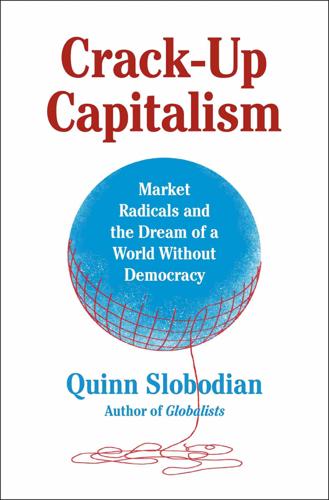
Crack-Up Capitalism: Market Radicals and the Dream of a World Without Democracy
by
Quinn Slobodian
Published 4 Apr 2023
Scholars call Hong Kong a “tycoon city” because the government is caught in a symbiotic relationship with the city’s billionaires, almost half of whom made their fortunes in real estate.93 The government retains ultimate control of the land in Hong Kong, but it auctions off long-term leaseholds, relying on continually rising property prices to finance its own operations through sales and fees.94 In a bestselling book, Alice Poon described the Hong Kong model as “real estate hegemony”—an economic model built on speculation as property replaced other forms of production.95 Likewise, in Britain’s tycoon nation, one-quarter of the richest people have property as their main source of wealth.96 The global cities of London, Hong Kong, and New York all have two-tier labor markets where most of the gains accrue to a small number of people at the top. The state’s primary role is in safeguarding rising property prices and granting whatever blandishments are necessary for mobile capital to call their city a temporary home. In “the plutocratic city,” urban governments see the presence of the super-wealthy as a sign of urban health.97 The result is a city with forces moving in two opposite directions: the rich are sucked in, inflating property values, and the poor are expelled.98 After soldiers returned from the trenches of the First World War, early social housing projects were called Homes for Heroes.